 Any delay in menstruation in women who have sexual life and do not plan to have a baby at the moment is perceived with panic. Unwanted pregnancy may change the life of any unmarried girl for the worse and abortion can deprive her of the opportunity to experience maternal happiness in the future. Any woman who does not want to give birth to a child currently wants to find an answer to the question:” How not to get pregnant and practice birth control using effective methods?” Here you will be able to find out answers to this question.
Any delay in menstruation in women who have sexual life and do not plan to have a baby at the moment is perceived with panic. Unwanted pregnancy may change the life of any unmarried girl for the worse and abortion can deprive her of the opportunity to experience maternal happiness in the future. Any woman who does not want to give birth to a child currently wants to find an answer to the question:” How not to get pregnant and practice birth control using effective methods?” Here you will be able to find out answers to this question.
There are a lot of commonly used methods, which show real effectiveness. However, you should understand that there is no such a method that is able to provide you with 100% guarantee as even using condoms there is some risk of becoming pregnant.
Contents
- Method number 1: Have an interrupted sexual intercourse
- Method number 2: Douche after sexual intercourse
- Method number 3: Calculate your safe days
- Method number 4: Measure basal temperature
- Method number 5: Use emergency contraception
- Method number 6: Do ovulation tests
- Method number 7: Use Lactational Amenorrhea Method (LAM)
- Method number 8: Insert an intrauterine spiral
- Method number 9: Use birth control suppositories
- Method number 10: Choose one of the barrier methods
- Method number 11: Use hormonal plaster or ring
- Method number 12: Use oral contraceptives
- Rating of effectiveness of contraception methods
- Video
Method number 1: Have an interrupted sexual intercourse
 With this method of protection, the man before the ejaculation takes the penis out of the vagina so that the sperm does not get into the genital tract of the woman. The popularity of this method among young people is explained by the fact that it gives an opportunity to have sex without a condom, which dulls the sensitivity of the male sexual organ. And the girl herself, when using this method of protection, does not need to take any pills or run to the bathroom to douche.
With this method of protection, the man before the ejaculation takes the penis out of the vagina so that the sperm does not get into the genital tract of the woman. The popularity of this method among young people is explained by the fact that it gives an opportunity to have sex without a condom, which dulls the sensitivity of the male sexual organ. And the girl herself, when using this method of protection, does not need to take any pills or run to the bathroom to douche.
However, you should keep in mind the following points:
- The sperm retains its own vitality for a long time, so this method is suitable only at the first sexual intercourse, if after a short rest you will repeat sexual intercourse, the risk of becoming pregnant will increase many times.
- After ejaculation, a small number of fully viable spermatozoa can remain on the mucosa of the penis head or in the urethra of the male, so before re-sexual contact for reliability it is better to ask the man to take a shower and empty the bladder. And women are also recommended to do the same.
Important: Despite the high popularity of this method, doctors say that it is not reliable, since spermatozoa, albeit in small numbers, can enter the female reproductive organs before ejaculation.
Back
Method number 2: Douche after sexual intercourse
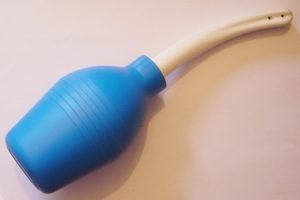 Douche is an express method of preventing unwanted pregnancies. The main purpose of douching is to “wash” the vagina with a spermicidal solution.
Douche is an express method of preventing unwanted pregnancies. The main purpose of douching is to “wash” the vagina with a spermicidal solution.
Special features of this method to take into account:
- This procedure should be done immediately after ejaculation as spermatozoa in a few minutes get into the cervix and beyond.
- After a longer time, this method becomes very inefficient. It is better to conduct it before sexual intercourse.
In this case, the remnants of the solution immediately begin to have an effect on the sperm. Usually, a solution of water of room temperature with the addition of table vinegar or citric acid is used. You can use these recipes:
- Lemon juice: Dip your fingers into the squeezed lemon juice and sweep them inside yourself. Repeat the procedure several times and do not wash the juice after this for at least 2-3 hours. It will come out later with secretions.
- Fresh urine: Many recommendations on how not to get pregnant without a condom are reduced to a thorough deep erosion with your own urine immediately after intimacy. Certainly, this is not a very pleasant ending of love affection, but it is better than urinotherapy or unwanted pregnancy.
Important: You shouldn’t use this method too often as it may be harmful for your health. The constant effect of acid on the walls of the vagina leads to a change in their structure and disruption of the microflora.
Back
Method number 3: Calculate your safe days
 There is a well-known method, which aim is to calculate dangerous and safe days for sexual acts, without using additional contraception. It happens this way: a woman who has a regular cycle does not have sexual relations for a few days before and after ovulation. The remaining days are considered safe for sex. Ovulation occurs 2 weeks after the onset of menstruation. However, this rule is relevant only for women who have a 28-day menstrual cycle. The rest do not have high hopes for this method. To calculate your individual most “safe” days, you need to know the duration of your cycle. An obligatory condition in this case is its sufficient stability:
There is a well-known method, which aim is to calculate dangerous and safe days for sexual acts, without using additional contraception. It happens this way: a woman who has a regular cycle does not have sexual relations for a few days before and after ovulation. The remaining days are considered safe for sex. Ovulation occurs 2 weeks after the onset of menstruation. However, this rule is relevant only for women who have a 28-day menstrual cycle. The rest do not have high hopes for this method. To calculate your individual most “safe” days, you need to know the duration of your cycle. An obligatory condition in this case is its sufficient stability:
- Select the longest and shortest menstrual cycles, for the study period (minimum six months).
- Deduct number 18 if there is a short cycle. So you will get the day from which the most dangerous period begins. For example: 24 – 18 = 6, i.e. the greatest chance of becoming pregnant begins with the 6th day of your menstrual cycle.
- Subtract the number 11 from the longest period. For example: 28 – 11 = 17, so the 17th day of your menstrual cycle is the last time you need to exercise high safety while having sex.
- It follows from the example considered that the greatest chance that an unintended pregnancy will occur is maintained between the 6th and 17th day of the menstrual cycle.
Important: The safest days in accordance with the existing calendar method of calculation can be considered two days before menstruation and two days after.
Back
Method number 4: Measure basal temperature
 You can try to find out the date of your ovulation by measuring the basal temperature. This is done for several consecutive cycles. Every morning, you should measure the temperature in the rectum with a thermometer, at the same time without getting out of bed. Before ovulation, a sharp drop in the temperature curve occurs followed by a take-off the next day above 37 degrees.
You can try to find out the date of your ovulation by measuring the basal temperature. This is done for several consecutive cycles. Every morning, you should measure the temperature in the rectum with a thermometer, at the same time without getting out of bed. Before ovulation, a sharp drop in the temperature curve occurs followed by a take-off the next day above 37 degrees.
Thigs to keep in mind while using this method:
- Every day, you should write down the measurement results in the graph. In the first half of the cycle, as a rule, the temperature is in the range of 36.6-36.9 degrees and after ovulation it rises to 37 and above.
- In advance to learn about your ovulation, you can carefully watch and analyze the schedule. A slight decrease in temperature, around 12-16 days, predicts the exit from the ovary in the next few hours. Accordingly, women who want to avoid pregnancy need to be protected by barrier contraception: condoms, vaginal caps, female condoms, spermicides, etc., or not to have sexual intercourse at all.
Important: However, this method can’t be recommended to women as the 100% guarantee as ovulation is unpredictable and some women are able to become pregnant even if the sperm has entered the vagina during or immediately after menstruation.
Back
Method number 5: Use emergency contraception
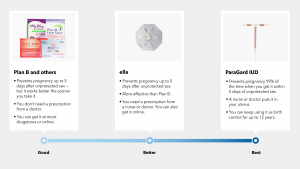 This contraception method is the reception of special pills that prevent the attachment of a fertilized ovum to the cell of the uterus, so that pregnancy does not occur. This can be done no later than 72 hours after unprotected sexual intercourse. Doctors recommend having it not more than 2-3 times a year, because drugs with this effect have some harmful effects on the body like bleeding, hormonal disruptions, violation of the cycle, etc. You should understand this before an unjustified reception and take a decision to use it only in case of real necessity if you had unprotected sexual relations:
This contraception method is the reception of special pills that prevent the attachment of a fertilized ovum to the cell of the uterus, so that pregnancy does not occur. This can be done no later than 72 hours after unprotected sexual intercourse. Doctors recommend having it not more than 2-3 times a year, because drugs with this effect have some harmful effects on the body like bleeding, hormonal disruptions, violation of the cycle, etc. You should understand this before an unjustified reception and take a decision to use it only in case of real necessity if you had unprotected sexual relations:
- in the middle of the cycle,
- in days of ovulation,
- after the rape, etc.
Important: With all the side effects of such pills, it is still a lesser evil for the female body compared to abortion.
Back
Method number 6: Do ovulation tests
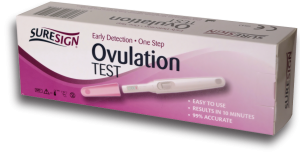 Pharmaceutical companies have developed special tests that are able to help women not get pregnant without being protected thanks to their properties to determine the days of ovulation, which are considered the most risky ones.
Pharmaceutical companies have developed special tests that are able to help women not get pregnant without being protected thanks to their properties to determine the days of ovulation, which are considered the most risky ones.
What is the mechanism of ovulation test work?
- Test main principle of work is similar to the tests that determine pregnancy;
- The result of the test is shown in two strips;
- Test reveals the peak of the luteinizing hormone (LH) – the moment of ovulation in the body of a woman.
- At the end of this time, the content of LH drops sharply, and the tests become “negative”.
The determination of ovulation not to become pregnant without being protected is a very complex method, which is absolutely not suitable for women with an irregular cycle. These processes are dependent on many factors, the cycle can shift and fluctuate for a number of reasons, which cannot be determined practically:
- nervous breakdowns;
- stresses;
- the use of various medications;
- various diseases;
- obesity or overweight;
- as well as underweight or sudden weight loss, which lead to hormonal failures.
When the menstrual cycle is irregular, it is virtually impossible to track ovulation. It may be absent for a couple of cycles in a row, or vice versa, happen twice in one month (which is not good for a woman).
Important: However, it should be remembered that these tests should be performed better twice a day because the morning peak of the hormone can fall if the ovulation occurs in the evening, showing a negative test, and the female body will be ready for the pregnancy.
Back
Method number 7: Use Lactational Amenorrhea Method (LAM)
 Among the natural methods of contraception there is such as the method of lactational amenorrhea. LAM is suitable only for women who are exclusively breastfeeding (up to six months the child does not receive anything other than breast milk from the mother) giving the baby a breast on demand and the biggest night breaks in feeding that do not exceed six hours (daily breaks between feedings – no more than two hours).
Among the natural methods of contraception there is such as the method of lactational amenorrhea. LAM is suitable only for women who are exclusively breastfeeding (up to six months the child does not receive anything other than breast milk from the mother) giving the baby a breast on demand and the biggest night breaks in feeding that do not exceed six hours (daily breaks between feedings – no more than two hours).
This method is based on very highly organized neurohormonal relationship between:
- the hypothalamic-pituitary system;
- target organs (mammary glands, ovaries, uterus).
Important: One single violation of the regime – and you risk becoming pregnant. Ovulation may occur and accordingly the fertilization of the ovum.
Back
Method number 8: Insert an intrauterine spiral
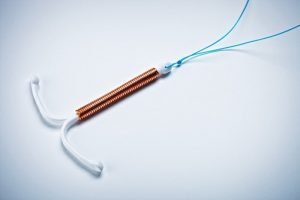 The intrauterine device is a common and rather simple method of contraception. This device is usually made of copper or silver with plastic. It is installed by the doctor in the uterus for several years. Copper or silver has a harmful effect on spermatozoa and the spiral itself, if fertilization does occur, it prevents the ovum
The intrauterine device is a common and rather simple method of contraception. This device is usually made of copper or silver with plastic. It is installed by the doctor in the uterus for several years. Copper or silver has a harmful effect on spermatozoa and the spiral itself, if fertilization does occur, it prevents the ovum
from adhering to the uterine cell (the embryo, therefore, has no way of developing).
The spiral as a method of avoiding unplanned pregnancy has a lot of pluses:
- The chances of a woman not to get pregnant grow up to 99%.
- The patient is not required to perform actions to support the effect of the spiral because it is established and is effective for a long time.
- Hormonal spiral is able to protect a woman from unwanted pregnancy.
- The intrauterine device does not interfere with sexual intercourse due to the fact that your partner will not feel it.
- The action of one spiral lasts about five years, on average, therefore it is considered a cheap contraceptive.
- Spirals of metal manufacture cannot influence the hormonal background of women who do not wish to become pregnant soon. It is for this reason that such a contraceptive is allowed to be placed by nursing mothers as well.
Important: The method is convenient because it does not require almost any effort on the part of a woman but has its drawbacks, for example, increases the risk of developing infections.
Back
Method number 9: Use birth control suppositories
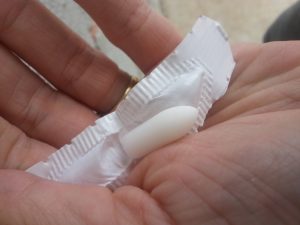 Contraceptive suppositories, in principle, stand in the line with creams and lubricants. They belong to the form of contraception that differs in composition. Some contain benzalkonium chloride, some – nonaxinalon. However, both these substances equally destroy the membrane of the sperm, making it less active and not allowing the fertilization of the ovum.
Contraceptive suppositories, in principle, stand in the line with creams and lubricants. They belong to the form of contraception that differs in composition. Some contain benzalkonium chloride, some – nonaxinalon. However, both these substances equally destroy the membrane of the sperm, making it less active and not allowing the fertilization of the ovum.
Of course, vaginal contraceptive suppositories do not give 100% guarantee. In case of using contraceptive suppositories, the risk of unintended pregnancy on average remains in 20% of women. To a greater extent, this risk is possible if the product is misused or stored. A mandatory condition for effectiveness is strict adherence to the rules of instructions for using contraceptive suppositories.
Like other chemicals, birth control suppositories are acids that do not have to enter into any interaction with the alkaline medium, otherwise their property will be lost. Therefore, the banal use of soap, for example, will significantly reduce the
activity of the product and may lead to the onset of an unwanted pregnancy. To wash off is better simply by warm water, or ph-neutral means, if this instruction is not forbidden.
Often, for advertising purposes, manufacturers indicate an inflated period of suppositories, and, in general, this category of drugs. However, you must remember that in fact, the operation of birth control suppositories actually lasts about 40 minutes, no more. Therefore, with long love games or repeated sexual contact, one more suppository should be used. Of course, with active sexual life, vaginal birth control suppositories will not protect you 100%, however they are able to provide you with certain advantages:
- This is an excellent alternative if there are contraindications to the use of hormonal contraception and the use of intrauterine spirals.
- Contraceptive suppositories have a dual action: providing an antiseptic effect, they affect sperm, but, in addition, “deadly” act on viral and bacterial pathogens.
- Therefore, in addition to contraception, vaginal contraceptive suppositories protect against certain sexually transmitted diseases. In addition, they give the effect of additional artificial lubrication, which is very useful with a small amount of natural lubrication.
- This is the perfect protection for casual sex, combined with a condom.
But everything has “the other side of the coin”. Acting on bacteria, these drugs affect the natural microflora of the vagina. That is, with regular and prolonged use they can develop dysbacteriosis of the vagina.
Important: Any chemical contraceptives may have an irritating local effect on the vaginal mucosa and even give allergic reactions like burning of the external genitalia.
Another negative point of using birth control pills is the lack of spontaneity in intimate life. To enter a candle it is necessary for certain time before a sexual contact, specified in the instruction.
Do not use birth control pills for inflammatory diseases of the female genitourinary system and during the use of vaginal therapy.
Back
Method number 10: Choose one of the barrier methods
 Condom is the only contraceptive among all of the above mentioned methods really protecting not only from pregnancy but also from any infections and bacteria. But its low reliability indicates that this product often fails (it simply tears). Besides condoms, there are such barrier methods used as:
Condom is the only contraceptive among all of the above mentioned methods really protecting not only from pregnancy but also from any infections and bacteria. But its low reliability indicates that this product often fails (it simply tears). Besides condoms, there are such barrier methods used as:
- Diaphragm,
- Cap,
- Sponge
They are inserted in the vagina just before the sexual intercourse.
Important: These methods of contraception require preparation for sexual intercourse – and, therefore, can significantly reduce sexual desire, cause discomfort and reduce sensitivity.
Back
Method number 11: Use hormonal plaster or ring
 The same level of reliability in these two methods does not mean the similarity of their application: the hormonal patch is glued to the skin, and the hormone ring must be inserted into the vagina independently.
The same level of reliability in these two methods does not mean the similarity of their application: the hormonal patch is glued to the skin, and the hormone ring must be inserted into the vagina independently.
Features:
- The hormonal patch should be glued every 7 days, starting from the first day of the cycle.
- The use of the hormone ring is the same for one cycle. It should be set from the 1st to the 5th day of the cycle, and after three weeks (on day 22), must be removed.
- On the 8th day of the break, a new one is introduced.
Important: It is precisely the observance of clear schemes that allows these methods to be effective, so they are suitable only for very organized women.
Back
Method number 12: Use oral contraceptives
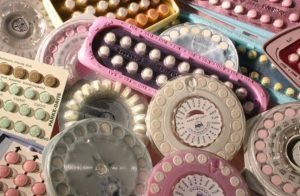 Hormonal pills are one of the most reliable methods of contraception. Their main feature is the mechanism of action on the body of a woman. They have a complex effect on the female reproductive system:
Hormonal pills are one of the most reliable methods of contraception. Their main feature is the mechanism of action on the body of a woman. They have a complex effect on the female reproductive system:
- ovulation is suppressed,
- the mucus thickens in the cervical canal,
- the endometrium layer in the uterus is thinning.
During the reception of the ovarian tablets, women “rest”, and the necessary dose of the hormone is provided by the drug. Condensation of cervical mucus in the cervix prevents the penetration of not only spermatozoa into the uterus, but also bacteria, thereby reducing the risk of infectious diseases. However, it should be understood that oral contraceptives do not protect against sexually transmitted infections. Also, when using this method of contraception, the blood loss of a woman during the period of menstruation decreases due to a decrease in the inner layer of the uterus.
Advantages:
- This effect has a positive effect on health in general, especially for women suffering from iron deficiency anemia.
- Hormonal tablets of the latest generation, in addition to the contraceptive effect, have a pronounced non-contraceptive effect: they have a positive effect on the skin and hair condition, eliminate PMS, shorten menstruation and reduce painful sensations during this period.
- Also, special attention should be paid to oral contraceptives of the latest generation, which contain an active form of folic acid in their composition. This component allows a woman to take care not only about her health, but also about the future generation
Important: Tablets with innovative regimens of reception are 24 + 4 and 26 + 2 can be distinguished. The non-hormonal period is shortened, which allows to reduce negative symptomatology to a minimum.
Back
Rating of effectiveness of contraception methods:
 1st place – the most reliable methods: surgical sterilization and hormonal contraceptives;
1st place – the most reliable methods: surgical sterilization and hormonal contraceptives;- 2nd place – intrauterine spiral;
- 3rd place – condoms as the probability of getting pregnant is less than 10%;
- 4th place – spermicide;
- 5th place – all other methods, the last one in the list is the interrupted sexual
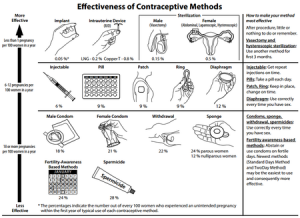 1st place – the most reliable methods: surgical sterilization and hormonal contraceptives;
1st place – the most reliable methods: surgical sterilization and hormonal contraceptives;




